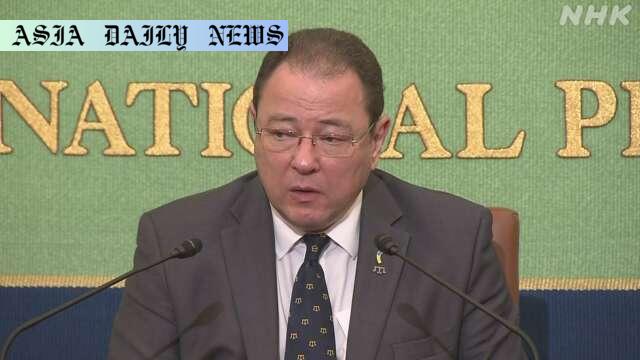Ceasefire: Ukraine’s ambassador to Japan affirms his country’s readiness to participate in peace talks and negotiations.
- Ukraine’s ambassador emphasizes the country’s role in peace talks.
- Compromises and security guarantees are critical to achieving a ceasefire.
- Progress is reportedly being made with engagements among key nations.

Introduction: Ukraine’s Commitment to Peace Talks
Ukraine’s ambassador to Japan, Sergiy Korsunsky, has reiterated the nation’s readiness to participate in peace talks concerning the ongoing conflict with Russia. Speaking at a news conference in Tokyo, this statement comes at a critical point in global discussions on the future of Eastern Europe amidst ongoing violence. The comments reflect Ukraine’s determination to contribute constructively toward a resolution, emphasizing that compromises and robust security assurances are essential components for success.
Current State of Peace Negotiations
The news of Ukraine’s engagement comes after the third anniversary of Russia’s invasion of Ukraine in 2020. Discussions facilitating a ceasefire continue to intensify, with Sergiy Korsunsky highlighting collaborations between various global powers. The ambassador credited nations like the United States and European partners for their crucial role in brokering potential breakthroughs. Talks between the U.S. administration and Russia are already underway, with U.S. President Donald Trump reportedly directing key diplomats to consult with Moscow, aiming to understand its perspective on the conflict. Likewise, Ukraine maintains an active dialogue with Washington, providing input on peace proposals and strategies for the region.
The Ukrainian Perspective on Security Guarantees
Drawing attention to the strategic priorities for Ukraine, the ambassador underlined the indispensability of security guarantees in the peace framework. Korsunsky acknowledged that compromises might be necessary but emphasized that such concessions must align with the broader goal of ensuring sustainable peace. The emphasis on guarantees highlights Ukraine’s lingering concerns about its vulnerability in the face of an unpredictable invasion, necessitating a strong and enforceable assurance system to prevent future escalations.
Outlook for a Ceasefire in 2023
There is growing optimism that a ceasefire agreement may be within reach, potentially as soon as this year. Korsunsky’s declaration, “I do believe that we will see a kind of ceasefire this year,” indicates that discussions with key stakeholders, including European nations, are bearing fruit. While no definitive timeline has been established, this positive outlook reflects evolving geopolitical dynamics, with diplomatic pressure mounting against continued aggression.
Global Implications of the Peace Process
The implications of these peace talks extend far beyond Ukraine and Russia. A resolution would signal a shift in global attitudes toward conflict resolution and multilateral engagement. It could also open the door for more effective international policies addressing similar crises worldwide. Additionally, the stability brought about by a ceasefire would benefit economies and humanitarian efforts globally, potentially restoring affected regions to a semblance of normalcy.
Conclusion: Challenges and Hopes
Though encouraging, the pathway to peace is fraught with challenges. Negotiators must navigate a complex web of political, security, and moral considerations while contending with differing visions from stakeholders. Yet, the firm stance of Ukraine to be actively at the table signals a renewed commitment, offering hope to millions affected by the ongoing crisis. As Ukraine and its allies work toward a peaceful settlement, the world watches with bated breath, recognizing this effort as a critical moment in the annals of diplomacy and conflict resolution.



Commentary
The Importance of Ukraine’s Involvement in Peace Efforts
The recent statement from Ukraine’s ambassador to Japan underscores a critical truth: no peace talks can succeed without the direct involvement of Ukraine. In the past, peace agreements have failed when excluded stakeholders refused to abide by imposed settlements. Sergiy Korsunsky’s emphasis on Ukraine’s seat at the negotiation table is not only a matter of principle but also a prerequisite for a lasting resolution. This insistence affirms that peace, to be sustainable, must incorporate the perspectives and needs of those most impacted.
The Weight of Security Guarantees
A key takeaway from the ambassador’s remarks is the focus on security guarantees. For Ukraine, having experienced an overt invasion, such guarantees are not just about territorial integrity—they are about survival and sovereignty. Without enforceable measures preventing future hostility, any ceasefire agreement would be undermined by lingering fears and instability. Ukraine’s insistence on these assurances highlights its learned caution and determination to ensure its people’s safety against further incursions.
Global Impacts of a Ceasefire
Beyond Ukraine’s immediate needs, the resolution of this conflict carries broader implications. A robust peace agreement could serve as a model for addressing conflicts globally. Furthermore, stabilizing Ukraine and its neighbors would ripple positively through economic systems, reducing energy crises, rebuilding war-torn infrastructure, and fostering regional growth. These outcomes underscore why global stakeholders are rallying behind diplomatic efforts to achieve peace.
Final Thoughts
In reflecting on Ambassador Korsunsky’s comments, it is evident that the road ahead remains challenging but not insurmountable. The willingness from all involved parties to negotiate suggests a shared acknowledgment that a prolonged conflict benefits no one. As Ukraine and its allies continue to pursue peace with determination and patience, the world may soon witness the beginnings of a resolution to one of the most pressing global conflicts in modern history.